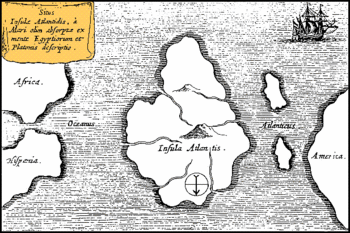ਅਟਲਾਂਟਿਸ
ਅਟਲਾਂਟਿਸ (ਪੁਰਾਤਨ ਯੂਨਾਨੀ: Ἀτλαντὶς νῆσος, "ਐਟਲਸ ਦਾ ਟਾਪੂ") ਇੱਕ ਗਲਪਮਈ ਟਾਪੂ ਹੈ ਜੀਹਦਾ ਜ਼ਿਕਰ ਪਲੈਟੋ ਦੀਆਂ ਸਿਰਜਾਂ ਟੀਮੀਅਸ ਅਤੇ ਕ੍ਰਿਟੀਅਸ ਵਿੱਚ ਮੁਲਕਾਂ ਦੇ ਗਰਬ-ਗ਼ੁਮਾਨ ਉੱਤੇ ਲਿਖੀ ਦੁਅਰਥੀ ਕਵਿਤਾ ਵਿੱਚ ਮਿਲਦਾ ਹੈ ਜਿੱਥੇ ਇਹਨੂੰ ਪਲੈਟੋ ਦੇ ਖ਼ਿਆਲੀ ਮੁਲਕ "ਪੁਰਾਤਨ ਐਥਨਜ਼" ਨੂੰ ਘੇਰਨ ਵਾਲ਼ੀ ਵੈਰੀ ਸਮੁੰਦਰੀ ਤਾਕਤ ਦੱਸਿਆ ਗਿਆ ਹੈ। ਕਹਾਣੀ ਮੁਤਾਬਕ ਐਥਨਜ਼ ਜਾਣੇ-ਪਛਾਣੇ (ਪੱਛਮੀ) ਜੱਗ ਦੇ ਬਾਕੀ ਮੁਲਕਾਂ ਤੋਂ ਉਲਟ ਅਟਲਾਂਟਿਸ ਦੇ ਹੱਲੇ ਨੂੰ ਪਿੱਛੇ ਧਕੱਲਣ ਵਿੱਚ ਕਾਮਯਾਬ ਹੋਇਆ ਸੀ[1] ਜੋ ਸ਼ਾਇਦ ਪਲੈਟੋ ਦੇ ਮੁਲਕੀ ਸਿਧਾਂਤ ਦੀ ਉੱਚਤਾ ਦਾ ਪ੍ਰਤੀਕ ਹੈ।[2][3] ਕਹਾਣੀ ਦੇ ਅੰਤ ਵਿੱਚ, ਅਟਲਾਂਟਿਸ ਉੱਤੇ ਦੇਵਤਿਆਂ ਦੀ ਮਿਹਰ ਖ਼ਤਮ ਹੋ ਜਾਂਦੀ ਹੈ ਅਤੇ ਇਹ ਅੰਧ ਮਹਾਂਸਾਗਰ ਵਿੱਚ ਡੁੱਬ ਜਾਂਦਾ ਹੈ।

ਹਵਾਲੇ
ਸੋਧੋ- ↑ Plato's contemporaries pictured the world as consisting of only Europe, Northern Africa, and Western Asia (see the map of Hecataeus of Miletus). Atlantis, according to Plato, had conquered all Western parts of the known world, making it the literary counter-image of Persia. See Welliver, Warman (1977). Character, Plot and Thought in Plato's Timaeus-Critias. Leiden: E.J. Brill. p. 42. ISBN 90-04-04870-7.
- ↑ Hackforth, R. (1944). "The Story of Atlantis: Its Purpose and Its Moral". Classical Review. 58 (1): 7–9. doi:10.1017/s0009840x00089356. JSTOR 701961.
- ↑ David, Ephraim (1984). "The Problem of Representing Plato's Ideal State in Action". Riv. Fil. 112: 33–53.
ਵਿਕੀਮੀਡੀਆ ਕਾਮਨਜ਼ ਉੱਤੇ ਅਟਲਾਂਟਿਸ ਨਾਲ ਸਬੰਧਤ ਮੀਡੀਆ ਹੈ।